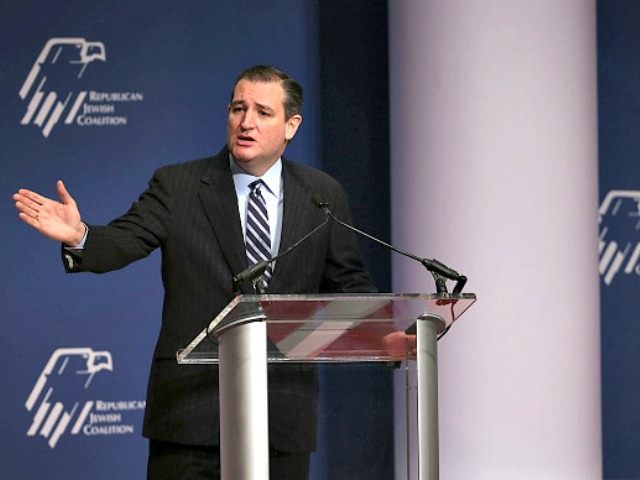The Republican Jewish Coalition hosted the GOP presidential contenders Thursday at the Ronald Reagan International Trade Building in Washington, D.C.
Each candidate had about 20 minutes or so to discuss their foreign policy vision for America. We offer our grades for each one:
Sen. Ted Cruz (R-TX): A
Cruz opened the event with a fiery address, promising that on his first day in office, the Texas Senator would start the process of moving the U.S. embassy in Israel to Jerusalem, its capital city. The embassy now resides in Tel Aviv due to the political dynamics of the Israeli-Palestinian conflict. Moving the embassy is a hugely important symbolic issue for supporters of Israel, as it shows a willingness to stand unapologetically side-by-side with the Jewish state.
He spoke broadly about how the U.S., Israel, and the West were engaged in a war against radical Islam.
In concluding his address, Cruz received a standing ovation for promising to “rip to shreds” the Iranian nuclear deal.
Dr. Ben Carson: A-
While most of the mainstream media was busy ridiculing the retired neurosurgeon for his pronunciation of the Palestinian terrorist group Hamas, Carson discussed the unique bond between Israel and America. He cited the Pilgrims, and American Presidents John Quincy Adams and Abraham Lincoln, in discussing how America and Israel share the identity as a “promised land.”
The west is currently engaged in a “clash of civilizations” with radical Islam, Carson added.
Naturally, Carson’s unique take and intellectually authentic expression of western morality blew completely over the head of many within the mainstream media, who, childishly, became infatuated with mocking his pronunciation of the word Hamas.
Carson laid out his three “core principles” for foreign policy:
1: “All foreign policy decisions must be made through the lens of national security interests.”
2: Recognize the ongoing “clash of civilizations” and be prepared to unite the west against its enemies
3: First becoming an economic powerhouse at home makes for an America that can succeed in its foreign engagements.
Sen. Marco Rubio (R-FL): B+
A fan favorite for the RJC crowd, many of whom are jumping ship from Gov. Jeb Bush as his campaign continues its downward spiral, Rubio focused much of his address on expressing his pro-Israel bonafides.
Rubio took a clear shot at GOP frontrunner Donald Trump, saying the Middle East conflict “is not a real estate deal with two sides arguing over money.”
Unfortunately for Rubio, his remarks appeared to echo sentiments expressed just 30 minutes before by Sen. Cruz. Due to timing, it appeared as if Rubio was mimicking Cruz in promising to move the American embassy to Jerusalem, and with his tough talk on Iran.
Overall, his focus remained very narrow, only discussing Middle East issues and not engaging the public-at-large. While Cruz impressively and passionately discussed the interconnectedness of the global jihad movement, Rubio mostly limited his remarks to issues related to Israel and America’s shared enemies.
Donald Trump: C
Trump was endearing and a bit insulting at the same time, joking with the mostly Jewish crowd that they couldn’t buy his influence.
Some analyzed that Trump was invoking an anti-Semitic Jewish influence stereotype, but most recognized that he was probably referencing the fact that the Republican Jewish Coalition Board of Directors is mostly made up of Rubio and Bush supporters.
Regardless of the controversy in his remarks, Trump was ill-prepared to express foreign policy know-how during the Q & A session. Asked which Arab leaders he would engage, Trump briefly mentioned “The King of Jordan” before moving on to another subject.
Carly Fiorina: A-
As always, the former HP CEO articulately discussed her foreign policy positions and her vision for the future of America.
Fiorina showed impressive command over several national security issues, from cybersecurity to the Islamic State terror group.
Unfortunately for her, the room was half empty by the time she delivered her remarks.
Jeb Bush: B
In a more energetic and confident speech than the public is accustomed to, he declared his brother, George W. Bush, as his honorary advisor on Israel. He did not discuss his anti-Semitic foreign policy advisor, James Baker.
Bush promised to “whoop” Hillary Clinton should he square off against the Democratic frontrunner
Chris Christie: B
Christie passionately discussed the continuing threat posed by the Islamic State terror group. “We need to come to grips with the idea that we are in the next World War,” he told the audience.
However, Christie confusingly stated “radical Islam isn’t a criticism of Islam. It’s a criticism of radicalism.”
In criticizing President Obama for failing to identify the San Bernardino attack as terrorism, Christie said: “The president continues to wring his hands and say ‘we’ll see,’ but those folks, dressed in tactical gear, with semi-automatic weapons, came there to do something.”
Sen. Rand Paul (R-KY): Incomplete
He failed to show up, citing a scheduling conflict in the Senate.

COMMENTS
Please let us know if you're having issues with commenting.